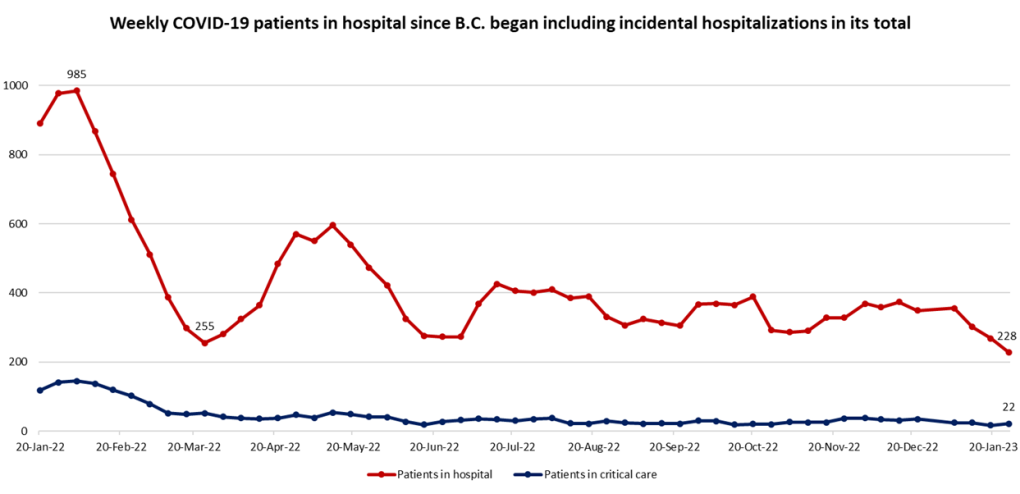
Fewer COVID-19 patients in B.C. hospitals today than at any point in 2022
 A sign at the entrance to Surrey Memorial Hospital is seen on Saturday, Feb. 5, 2022. (CTV)
A sign at the entrance to Surrey Memorial Hospital is seen on Saturday, Feb. 5, 2022. (CTV)
The number of people hospitalized with COVID-19 in B.C. has reached its lowest level in more than a year.
The B.C. Centre for Disease Control reported 228 test-positive patients in hospitals across the province as of Thursday. The last time the hospital population was that low was before the BCCDC switched counting methods and began including "incidental" hospitalizations in its weekly total.
 The number of patients in B.C. hospitals with COVID-19 on Thursdays since the province started including incidental cases in its count is shown. (CTV)
The number of patients in B.C. hospitals with COVID-19 on Thursdays since the province started including incidental cases in its count is shown. (CTV)
That switch happened in January 2022. Until this week, the lowest number of patients in hospital on a Thursday since that change had been 255 on March 24, 2022.
"Incidental" COVID-19 hospitalizations are those in which a patient tests positive for the disease after being admitted to hospital for some other reason.
Before January 2022, B.C. reported only hospitalizations in which COVID-19 was believed to be the underlying cause. The last time that count was below 228 was the last day of 2021, when there were 220 patients in hospital under the old counting method.
Health officials have said between 40 and 50 per cent of the patients in hospital with COVID-19 each week are there because of the disease, while the rest are incidental hospitalizations.
OTHER DATA
Thursday's update from the BCCDC also included 408 new lab-confirmed cases of COVID-19 from the week of Jan. 15 to 21, a substantial decrease from the 560 reported the week before and the lowest total reported since the week of Oct. 30 through Nov. 5.
There were also 104 new hospital admissions – a different metric than the currently hospitalized population – during the week of Jan. 15 to 21, down from 142 initially reported during the preceding week.
Both the weekly case count and new hospital admissions are imperfect measures. The former does not include reinfections or at-home rapid antigen tests, while the latter is always revised higher in the following week's report.
Because of the limitations of the weekly case count, experts have estimated that B.C.'s official figures for COVID-19 infections are off by roughly 100-fold.
Still, both cases and new hospital admissions are trending downward, and wastewater surveillance – which was recently expanded to include communities in the Interior and on Vancouver Island – has been pointing in the same direction.
This week's wastewater data has not yet been released, but as of last week's update, every monitored treatment plant in the province was showing decreased concentrations of the coronavirus.
VACCINATION AND 'KRAKEN'
In an update last week, federal health officials said it's unclear whether the XBB.1.5 lineage of SARS-CoV-2 – also known as the "Kraken" variant – will become the dominant strain of COVID-19 in Canada, but it's proportion of the country's total infections has been rising.
Citing this risk, Chief Public Health Officer Dr. Theresa Tam and federal Health Minister Jean-Yves Duclos echoed advice from the National Advisory Committee on Immunization, which continues to urge all Canadians ages five and older to get a booster dose of a bivalent COVID-19 vaccine if they haven't already.
In B.C., 19,291 doses of vaccine were administered during the week that ended Jan. 21.
While 83 per cent of residents of all ages have received at least two doses of a COVID-19 vaccine, significantly fewer have had a booster dose. As of Jan. 22, 56 per cent had had at least three doses, with 32 per cent – mostly those in the older age groups more susceptible to serious illness – had had at least four.
CTVNews.ca Top Stories

BREAKING King Charles' cancer treatment progressing well, says Buckingham Palace
King Charles III’s doctors are 'sufficiently pleased' with his cancer treatment and he is expected to return to public-facing duties, Buckingham Palace announced on Friday.
BREAKING Orca calf that was trapped in B.C. lagoon for weeks swims free
An orca whale calf that has been stranded in a B.C. lagoon for weeks after her pregnant mother died swam out on her own early Friday morning.
'Unacceptable': Trudeau reacts after AFN chief says headdress taken from plane cabin
After the Assembly of First Nations' national chief said her headdress was taken from an airplane cabin this week, Prime Minister Justin Trudeau called the incident 'unacceptable' and a 'mistake' on the part of Air Canada.
DEVELOPING Bird flu outbreaks: WHO weighs in on public health risk
The current overall public health risk posed by the H5N1 bird flu virus is low, the World Health Organization said on Friday, but urged countries to stay alert for cases of animal-to-human transmission.
Sophie Gregoire Trudeau on navigating post-political life, co-parenting and freedom
Sophie Gregoire Trudeau says there is 'still so much love' between her and Prime Minister Justin Trudeau, as they navigate their post-separation relationship co-parenting their three children.
Regina police officer injured after being accidentally shot by fellow officer's gun
An investigation is underway after a Regina police officer was accidentally shot by a fellow officer’s gun during the search of a house early Friday morning.
From faulty kids' cribs to flammable kids' bathrobes, here are the recalls of the week
Health Canada issued recalls for various items this week, including kids’ bathrobes, cribs and henna cones.
Taylor Swift dons Montreal designer's dress in 'Fortnight' video
A pair of Montreal designers' work has now been viewed over 41 million times. Taylor Swift dons a Victorian throwback black gown in her latest music video, 'Fortnight', designed by UNTTLD due Simon Belanger and Jose Manuel Saint-Jacques.
Island near Mull of Kintyre for sale for US$3.1 million
An idyllic 453-acre private island is up for sale off the west coast of Scotland and it comes with sandy beaches, puffins galore, seven houses, a pub, a helipad and a flock of black-faced sheep.































